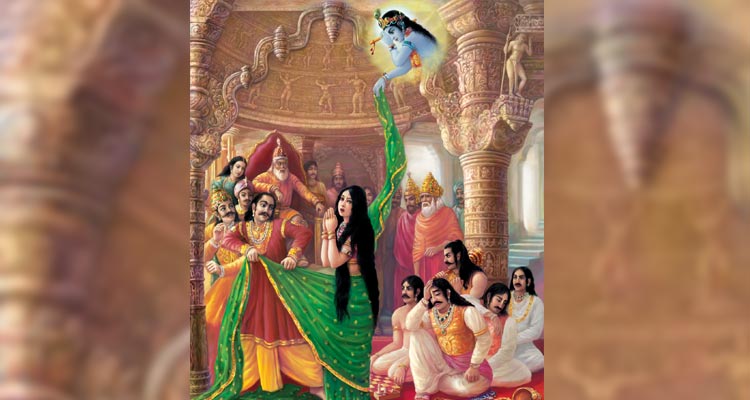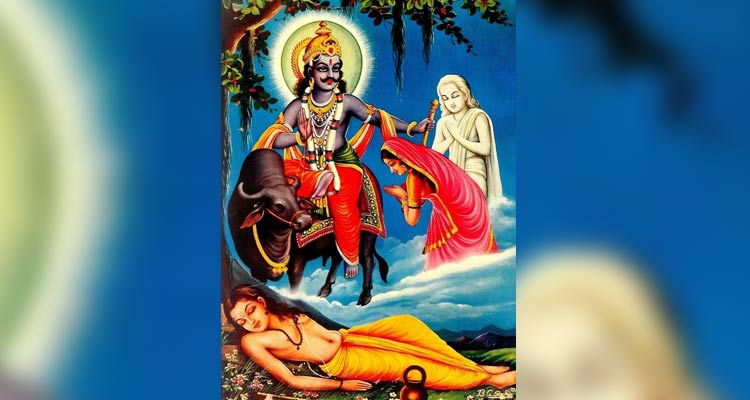The more he thinks thus, the better he understands Draupadi’s commitment towards them. Despite what had been done to her because of his choices, she had chosen to be exiled with them. She did have the choice to return to Kampilya, but she didn’t. The Pandavas were not perfect despite the reputation of being on the right side of Dharma. They all had different characteristics and flaws. While together, they signified perfection; individually, they were flawed people. And Draupadi completed them. She stuck to them despite everything.
Can there be another woman like her?
While in the forests, the sage Markandeya visits them. Yudhisthira has one question for him. Was there any woman in history who was as devoted to her husband as Draupadi was to the Pandavas? Sage Markandeya gives him the example of Satyavan and Savitri. Long before the events of the Mahabharata, the king of Madra, Aswapati, lives like an ascetic for many a year and offers oblations to the Sun God. His consort is Malavi. One day, he wishes for a son to be born to him. The Sun God blesses him with a daughter instead. In honour of the God, they name her Savitri. She is so beautiful and pure that she intimidates the men in the vicinity. When she reaches the age of marriage, no man would ask for her hand. So her father asks her to find one herself. For this purpose, she sets out on a pilgrimage and finds a young man named Satyavan, who is the son of a blind king named Dyumatsena of the Salva kingdom. The latter had lost everything and lives in the forest with his wife and son. Related reading: Why Gandhari’s decision to blindfold herself was wrong
I chose the man, even if he is cursed
Savitri returns home to find the sage Narada speaking with her father. The sage tells him that though Savitri chose a man who, no doubt, was perfect, she had made a wrong choice. The sage apprises them that Satyavan is destined to die in a year’s time. Her father pleads with her, but Savitri convinces him that she has already chosen and will not do so again. Aswapati bows down to her request. Savitri and Satyavan get married with great pomp. And then she goes to live in her husband’s home, as is the custom, in the forest. She relinquishes her royal attire and takes the guise of a hermit. She serves her husband and her in-laws as a dutiful wife and daughter-in-law. Three days before Satyavan’s death, she takes a vow of fasting and vigil. Her father-in-law tells her that she is being harsh on herself. Savitri, though, tells him of her oath and that she has to complete the austerities. Dyumatsena offers his support after much deliberation. When THE DAY comes, she asks Dyumatsena for his permission to follow his son after his death. Since, thus far, she had not asked for anything, he grants her wish. Related reading: The little known story of Urmila’s love for Lakshmana in the Ramayana
At the appointed time, the God of Death appears
Together, the married couple goes into the forest to cut wood and find timber. Satyavan becomes weak and lays his head on her lap. Yama, the God of Death, comes himself to collect Satyavan’s soul. Savitri follows the God of Death, who does everything in his power to deter her from following. Whenever he tries to convince her that her attempts are futile, she offers her wisdom by praising Dharma, Tantra, and Yama himself. Impressed, Yama asks her to ask for any boon, save for her husband’s life. So she asks that her father-in-law’s sight be returned, for a hundred children for her father, and then, lastly, a hundred children for herself and Satyavan. Yama realises that she had indirectly asked for Satyavan’s life, as the last boon required Satyavan to be alive. Impressed by her dedication and persistence, he offers her one more boon; this time, he leaves out his prior condition. Savitri, in that instant, asks for her husband’s life to be restored. Yama does so and they both return to their forest home.
Sacrifice does not imply weakness, but strength
Now, both Draupadi and Savitri dedicated themselves to the people they love. Savitri was given three boons and she managed to salvage her husband’s life. Draupadi was also given three boons, which she used to get whatever her husbands had lost back to them. The moral here (there can be many morals; I choose to take this one) is their grasp on love, which is the basis for all humanity. From here it may seem that it is only the women who sacrifice. While, indeed, it is true (women have sacrificed much and our folklore does have stories where womankind is shown as subservient but strong in a different way (consider Draupadi and Savitri)), if one removes the gender-equality angle, one can just induce that for love to persist, dedication is required. More than that, devotion to each other. Love comes in different ways, so when it does strike, one should never lose that opportunity. Only the dedicated may find true happiness in love.


